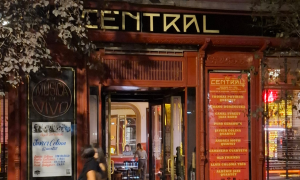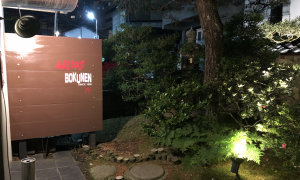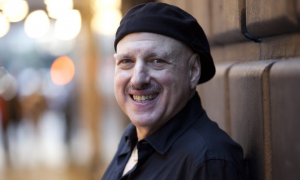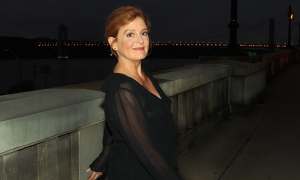Home » Jazz Articles » The Jazz Life » Some Kind Of Normal—The new, East Coast Jazz Festival
Some Kind Of Normal—The new, East Coast Jazz Festival

Courtesy Keystone Corner Baltimore
The festival will present something like 18 groups in six hours. That’s unprecedented, and while it will be live streamed rather than performed in front of a live audience, it also is a sign that live streaming will be one of the salient positives of the pandemic.
—Todd Barkan
If you haven't heard much about Todd, despite him being a National Endowment of the Arts Jazz Master, that's because club owners aren't generally household names in jazz except to the musicians they book, but he has a track record a mile long and has contributed substantially to the survival of the music we all love. From 1972 to 1983, he ran a club in North Beach, San Francisco called Keystone Korner which journalist Bob Margolis described on MTV News as "legendary for its adventurous bookings and its bohemian ambience." He managed Yoshi's, a club in Oakland, CA for three years and then left in 1993 to work as a record producer for labels like Fantasy, Columbia, Sunnyside, and Concord, as well as quite a few Japanese labels. By 2001 he was working as the director of Dizzy's Club Coca-Cola at Jazz at Lincoln Center in New York, a position he held for the next twelve years. Starting in 2013, he began hosting a jazz night at Iridium, another club in New York City. And then, in 2019, Barkan and Michelin-starred chef Robert Wiedmaier re-launched the Keystone Korner, this time in Baltimore's Harbor East. All was going well until Covid struck...
Of course, jazz musicians and promoters are some seriously resilient mofos. In the spring and early summer, for example, despite the echoes of ambulances wailing through New York City streets, almost constantly it seemed, and spontaneous pot banging and cheering every night at seven o'clock promptly, we also started to see spontaneous mini masked concerts pop up in the park, or outside coffee bars or pubs. Musicians still wanted to play, regardless of the venue and people wanted to listen. Walking in Riverside Park up by 103rd Street in Manhattan, with a cool breeze wafting in off the rippling Hudson River just below you, you might catch Oz Noy and a trio, Saul ZebulonRubin playing duo or solo guitar, Sean Smith and Pete Smith doing their great bass/guitar The Smiths Duo, a group of enthusiastic greying banjo, violin and guitar players, a youth classical orchestra, a string quartet—all for free if you stopped walking long enough to listen. Down in the Village you might stumble across Benny Benack III with his trumpet and zippered black mask, and Emmet Cohen and Russell Hall playing outside a coffee bar. But when the cold set in all that stopped, snatching away the last real opportunity for the one thing that we crave more than anything else—the opportunity to perform in front of people. Yeah, we've had all this time to really practice, but without the chance to really perform practicing becomes something else, and harder to do. Not performing is probably the thing we've all had the hardest time with, and despite all the efforts to somehow compensate for something so basic, like going onto Instagram, Facebook or YouTube, perhaps setting up a Patreon account, with filmed snippets of performances, or even if you're super lucky and been part of streaming performances as many surviving clubs take their wares online, there is still nothing quite like playing in front of real people.
The thing that has been intriguing me most is how jazz is going to look and feel after we get back to normal, a word that no sane person would likely ever really use about jazz and jazz musicians in the first place. How will Covid's aftermath shape jazz performances and availability?
So, I thought I'd talk to some club owners to get their take on things, and Todd is an obvious first choice to interview for that. The first thing he talked to me about was the upcoming East Coast Jazz Festival he's part of, a reinvention of a festival that began in the 1990s before dissolving in the early 2000s into something else.
On Saturday, March 20, 2021, from 5pm-11pm, six major east coast jazz clubs band together in a virtual musical extravaganza (for jazz, anyway) that is the first ever simultaneous multi-city presentation by jazz clubs anywhere. The proprietors of Scullers Jazz Club in Boston, Smalls and Birdland in New York, Chris' Jazz Café in Philadelphia, Keystone Korner Baltimore and Blues Alley in Washington, DC will stream live performances from six different stages, mixed in with some pre-recorded sessions, and will showcase the talents of more than 60-plus great jazz musicians.
A long time ago, when being a jazz musician in the U.S. could earn you a living pretty much, a booking somewhere could last a year, and there was a jazz circuit around the country you could plug into. Since then, it's become pretty catch-as-catch-can even when you're a headliner, and a week somewhere is a luxury. So the idea of jazz clubs working together like this is exciting in terms of what it might lead to when things get "normal" again.
Here is part of a conversation I had with Todd Barkan in early March 2021. (It's been edited for clarity and shortened for space.)
I first asked him how he thought jazz was coping with the struggles of musicians to present their music to audiences who could not gather together.
"Jazz has been struggling since the 1940s," he said. "There used to be a jazz club circuit around the country that would present musicians. You could play for maybe 8-10 weeks at a time, but that all ended by about 1983. Now people do 2 or 3 dates and come back home.
"Music is about shared cycles of activity, and clubs like Keystone Korner are conduits. The audience recycles the energy of the musicians and gives it back to us and so when it's not there it's harder, that's true."
I asked him if there was or could be some beginning parallel with all this online activity to the music scene of the 1950s and 1960s, when musicians pretty much could make a living just going into the studio and cutting a record. I recall a conversation I once had hanging out with a well-known Blue Note record musician about a classic recording he had been on, and he said offhandedly, "Man I don't really remember that stuff. I just came in, played the date, got my bread, and left." Now, I think he may have been shining me on a bit, but not entirely. I mentioned this to Todd.
"Yes, there is some potential parallel with those times, I think. The club is where the music is nurtured. The studio is where it is recorded. The online aspect of what musicians have been doing during Covid will continue. It's true though, that people cherish live performance and they will become more important than ever. There's no substitute for the real thing, how soul satisfying it is to experience it live and in person.
"But there's still the problem of helping people find musicians, encouraging them to come and hear them, and online things will definitely help us in that regard. Online, after all, there are no borders and no travel restrictions.
"I don't think jazz will suffer more than any other art form post-Covid. In fact, I think there will be a new passion for it. My career stretches back nearly 60 years, and I think the one thing we'll take away from the Covid experience is that we'll never again take for granted the ability to commune with people, the luxury of sharing space with others. We should learn from all this that we better start sharing and caring more for each other. We just can't take that for granted again.
"We all had to pretty much completely shut down when Covid hit. I lost my staff and only now as I reinvent myself and the club am I starting to be in a place where I can think about rehiring and retraining people. Because I believe people are going to come back to the clubs when they have the chance to. They miss the live performances. I don't know if it hurts or helps, but I'm the only jazz club in Baltimore and many others like me had to completely close. We reinvented ourselves on line, for the moment anyway. But within a year I think there will be new clubs popping up. At least I hope so. Blues Alley, for example, in D.C., is moving physically, but found a way to be part of the festival anyway.
"The festival will present something like 18 groups in six hours. That's unprecedented, and while it will be live streamed rather than performed in front of a live audience, it also is a sign that live streaming will be one of the salient positives of the pandemic. It has forced innovation that won't go away. For the last year or so online concerts have been 90% of our business and even though people will be back in person, the ability to stream a performance to a larger audience than the live one present in the club, to use parts of the original live stream to promote a musician, to bring people in is going to become bigger not smaller in my opinion. Bill Charlap, for instance, a great pianist, might have a night in the club where he draws maybe 40 people, but with streaming that same performance can have 190 on line paying to watch him play at the same time.
"I think the online part of things will help to spread jazz and will be increasingly beneficial. It's in its infancy compared to where it could be in a few years. What Spike Wilner is doing at Smalls and Mezzrow [in New York City], for example, even before Covid, where you could join the club to get access to the archives of recordings or watch the gigs streaming live meant that the clubs would often be packed with people because the online streaming created a kind of jazz tourism.
"Covid has forced us club owners to reach out and touch each other, to form a bond out of a commonality of need. New York is a media center, of course, and so Spike and Gianni (Johnny) Valenti of Birdland may have it a little easier in terms of raising money. But in Baltimore, for example, as I said, I'm the only club, so it's so much harder to sustain it in some ways, to fill those 240 seats regularly.
"The silver lining to all this will be that online broadcasts become a way of disseminating and expanding and developing music and musicians. It will become an essential part of the business if it hasn't already.
"I can take the online stream and use it like a movie trailer, I can use it to advertise, pull in a crowd for Friday through Sunday sets. There's all kinds of uses. "
So, the future is looking brighter it seems. As my Grandma used to say, "From his mouth to God's Ear."
Click here for the full line-up.
Tags
The Jazz Life
Peter Rubie
Todd Barkan
Sonny Rollins
keystone korner
Yoshi's
Dizzy's Club Coca-Cola
Iridium
Oz Noy
Saul Rubin
Sean Smith
Pete Smith
Bennie Bennack III
Emmet Cohen
Russell Hall
Scullers Jazz Club
SMALLS
Birdland
Chris' Jazz Cafe
Blues Alley
Bill Charlap
Spike Wilner
PREVIOUS / NEXT
Support All About Jazz
 All About Jazz has been a pillar of jazz since 1995, championing it as an art form and, more importantly, supporting the musicians who make it. Our enduring commitment has made "AAJ" one of the most culturally important websites of its kind, read by hundreds of thousands of fans, musicians and industry figures every month.
All About Jazz has been a pillar of jazz since 1995, championing it as an art form and, more importantly, supporting the musicians who make it. Our enduring commitment has made "AAJ" one of the most culturally important websites of its kind, read by hundreds of thousands of fans, musicians and industry figures every month.























